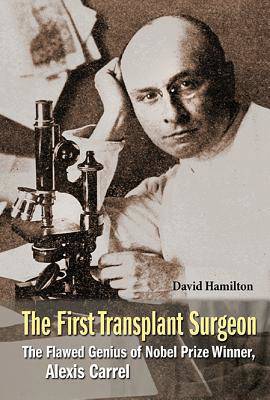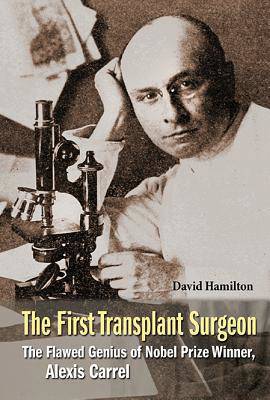
Door een staking bij bpost kan je online bestelling op dit moment iets langer onderweg zijn dan voorzien. Dringend iets nodig? Onze winkels ontvangen jou met open armen!
- Afhalen na 1 uur in een winkel met voorraad
- Gratis thuislevering in België vanaf € 30
- Ruim aanbod met 7 miljoen producten
Door een staking bij bpost kan je online bestelling op dit moment iets langer onderweg zijn dan voorzien. Dringend iets nodig? Onze winkels ontvangen jou met open armen!
- Afhalen na 1 uur in een winkel met voorraad
- Gratis thuislevering in België vanaf € 30
- Ruim aanbod met 7 miljoen producten
Zoeken
First Transplant Surgeon, The: The Flawed Genius of Nobel Prize Winner, Alexis Carrel
David Hamilton
Paperback | Engels
€ 54,95
+ 109 punten
Uitvoering
Omschrijving
This is a new account, of how, in the early 1900s, the French-born surgeon Alexis Carrel (1873-1944) set the groundwork for the later success in human organ transplantation, and gained America's first Nobel Prize in 1912. His other contributions were the first operations on the heart, and the first cell culture methods. He was prominent in military surgery in WW1, and in the 1930s, gained further fame when collaborating with the aviator Charles Lindbergh on an organ perfusion pump.But controversy followed his every move, including concerns over scientific misconduct, notably his claim to have obtained 'immortal' heart cells, now shown to be fraudulent. In 1934, he authored a best-selling book Man, the Unknown based on his strongly-held conservative, spiritual, political and eugenic views, adding a belief in faith healing and parapsychology. He settled in Paris in WW2 under the German occupation, believing that the conditions would allow him to refashion the degenerate Western civilization. His extremist views re-emerged in the 1990s when they proved interesting to right-wing politicians, and in a bizarre twist, jihadist Islamists now laud his criticisms of the West.
Specificaties
Betrokkenen
- Auteur(s):
- Uitgeverij:
Inhoud
- Aantal bladzijden:
- 608
- Taal:
- Engels
Eigenschappen
- Productcode (EAN):
- 9789814699372
- Verschijningsdatum:
- 8/11/2016
- Uitvoering:
- Paperback
- Formaat:
- Trade paperback (VS)
- Afmetingen:
- 152 mm x 226 mm
- Gewicht:
- 929 g

Alleen bij Standaard Boekhandel
+ 109 punten op je klantenkaart van Standaard Boekhandel
Beoordelingen
We publiceren alleen reviews die voldoen aan de voorwaarden voor reviews. Bekijk onze voorwaarden voor reviews.











